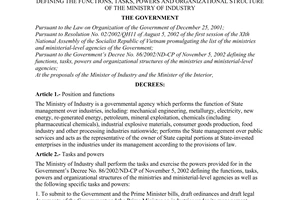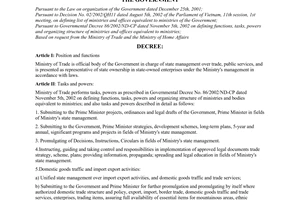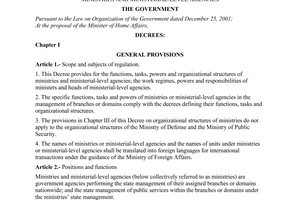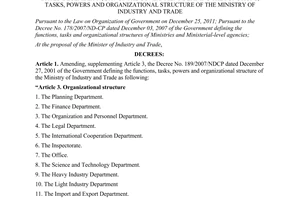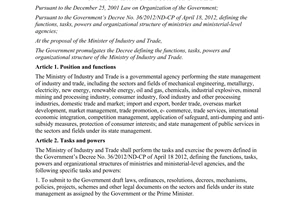Decree No. 189/2007/ND-CP of December 27, 2007, defining the functions, tasks, powers and organizational structure of the Ministry of Industry and Trade. đã được thay thế bởi Decree No. 95/2012/ND-CP defining the functions, tasks, powers and organizationa và được áp dụng kể từ ngày 26/12/2012.
Nội dung toàn văn Decree No. 189/2007/ND-CP of December 27, 2007, defining the functions, tasks, powers and organizational structure of the Ministry of Industry and Trade.
|
THE GOVERNMENT |
SOCIALIST
REPUBLIC OF VIET NAM
|
|
No. 189/2007/ND-CP |
Hanoi, December 27, 2007 |
DECREE
DEFINING THE FUNCTIONS, TASKS, POWERS AND ORGANIZATIONAL STRUCTURE OF THE MINISTRY OF INDUSTRY AND TRADE
THE GOVERNMENT
Pursuant to the December 25,
2001 Law on Organization of the Government;
Pursuant to the Governments Decree No. 178/2007/ND-CP of December 3, 2007,
defining the functions, tasks, powers and organizational structures of
ministries and ministerial-level agencies;
At the proposal of the Minister of Industry and Trade and the Minister of
Home Affairs,
DECREES:
Article 1. Position and tasks
The Ministry of Industry and Trade is a governmental agency performing the state management of industry and trade, including the following branches and domains: mechanical engineering, metallurgy, electricity, new energy, renewable energy, oil and gas, chemicals, industrial explosives, mining and mineral processing industries, consumer industry, food industry and other processing industries, and domestic goods circulation; import and export, market management, trade promotion, e-commerce, trade services, international economic-trade integration, competition management, monopoly control, application of safeguard, anti-dumping and anti-subsidy measures and measures to protect consumer interests; and the state management of public services in the branches and domains under the Ministrys state management.
Article 2. Tasks and powers
The Ministry of Industry and Trade shall perform its tasks and powers defined in the Governments Decree No. 178/2007/ND-CP of December 3, 2007, defining the functions, tasks, powers and organizational structures of ministries and ministerial-level agencies, and the following specific tasks and powers:
1. To submit to the Government draft laws, ordinances, resolutions, decrees, mechanisms, policies and other legal documents on the branches and domains under the Ministry’s state management as designed by the Government or the Prime Minister.
2. To submit to the Prime Minister for approval, and implement, strategies and master plans; branch and domain strategies and plannings; regional and territorial plannings, development programs, national target programs, technical-economic programs, important projects, and other legal documents in the branches and domains under the Ministry’s management.
3. To approve strategies, plannings and programs on the development of branches and domains under the Ministry’s state management, and of regions and territories as decentralized or authorized by the Government or the Prime Minister.
4. To promulgate decisions, directives and circulars; to direct guide, inspect and implement legal documents under the Ministry’s management; to communicate, propagate, disseminate and educate laws on industry and trade.
5. To formulate standards and promulgate processes, regulations and econo-technical norms in the branches and domains under the Ministry’s state management; to manage, guide and inspect conditional business lines in the industry and trade sector according to the list prescribed by the Government or the Prime Minister.
6. To assume the prime responsibility for evaluating, or approve, inspect and supervise the execution of, investment projects in the industry and trade sector under the its management.
7. To provide for the grant, modification, revocation and extension of permits related to electricity, chemicals, industrial explosives and cigarette production, other permits, certificates and registration papers in accordance with law.
8. To coordinate with the Ministry of Finance in drawing up national plans on petrol and oil, industrial explosive, cotton-seed and other reserves according to the Governments regulations.
9. Regarding industrial technical safety:
a/ To manage, direct, inspect, and take responsibility for, industrial technical safety and industrial environmental protection in accordance with law;
b/ To propose a list of machines, equipment and supplies subject to strict labor safety requirements in the branches and domains under the Ministry’s management and request the Ministry of Labor, War Invalids and Social Affairs to promulgate that list;
c/ To formulate and promulgate processes of appraisal of machines and equipment subject to strict labor safety requirements under the Ministry’s state management after obtaining the evaluation opinion of the Ministry of Labor, War Invalids and Social Affairs;
d/ To formulate and promulgate operation criteria and conditions for appraisal organizations that appraise machines and equipment subject to strict labor safety requirements under the Ministry’s state management after obtaining the evaluation opinion of the Ministry of Labor, War Invalids and Social Affairs;
e/ To guide, examine and inspect the implementation of legal provisions on safety of machines, equipment and supplies subject to strict labor safety requirements.
10. Regarding mechanical engineering and metallurgy:
To direct and inspect the implementation of strategies, plannings, plans and policies on the development of mechanical engineering and metallurgy industries, key mechanical and mechanical-electronic products and hi-tech products in combination with mechanical techniques, automation and industrial electronics.
11. Regarding electricity, new energy and renewable energy:
a/ To approve provincial/municipal electricity development plannings; to publicize a list of electricity works under the electricity development planning in order to attract investment in and manage the execution of those works;
b/ To approve cascade hydropower, new energy and renewable energy plannings;
c/ To direct and perform tasks related to atomic electricity, new energy and renewable energy;
d/ To promulgate regulations on the formulation, evaluation, consultation and approval of electricity retail prices.
12. Regarding oil and gas:
a/ To approve plans on early exploitation of oil and gas at oil fields;
b/ To decide on the closure of oil fields in case contractors fail to develop the fields and exploit oil and gas within the approved time limit;
c/ To decide to allow the burning of associated gas;
d/ To review, monitor and report on the development, exploration, exploitation and consumption of oil and gas in the country and for export.
13. Regarding mining and mineral processing industries (except minerals used as construction materials and for cement production):
a/ To formulate and submit to competent agencies for promulgation, or promulgate according to its competence, legal documents on mineral exploitation and processing industry;
b/ To direct and organize the implementation of plannings and plans on mineral exploitation, processing and use after they are approved;
c/ To direct, guide, inspect and supervise the observance of regulations, econo-technical norms, technologies, safety and sanitation and environmental protection in mining and mineral processing;
d/ To evaluate basic designs of works under investment projects on mineral exploitation and processing;
e/ To promulgate a list of, and conditions and standards for, minerals banned or restricted from export in accordance with law.
14. Regarding chemicals and industrial explosives:
a/ To monitor, direct, guide the inspection of, and review the situation of development of the chemical industry;
b/ To publicize a list of industrial explosives banned or restricted from use; to inspect the implementation of regulations on production, import, supply and use of industrial explosives.
15. Regarding consumer industry, food industry and other processing industries:
a/ To inspect and supervise investment under investment projects in consumer and food industries in accordance with law;
b/ To direct and inspect the implementation of strategies, plannings, plans and policies on the development of consumer and food industries;
c/ To guide and inspect the application of standards and technical regulations on the quality of industrial products, industrial hygiene and safety and environment; food safety and hygiene from the stage of import of raw materials for food production and processing under its state management to the time when products are put on the domestic market and for export.
16. Regarding local industrial and trade development:
a/ To formulate and submit to a competent authority for promulgation, or promulgate according to its competence, mechanisms, policies, strategies, plannings and plans on local industrial development;
b/ To review the situation of local industrial development and manage district-level industrial clusters and points and industrial enterprises in localities;
c/ To guide, inspect and supervise the implementation of branch and regional plannings in the industry and trade sector nationwide;
d/ To formulate mechanisms for promoting, supporting and orientating local industrial and trade development under the Ministry management;
e/ To disseminate experience of production, management, science and technology, investment, training, information supply, exhibition, fair, and product advertisement to local industrial and trade establishments;
f/ To formulate programs and plans on, and manage national industrial extension funds.
17. Regarding domestic circulation, import and export of goods:
a/ To implement mechanisms and policies on domestic trade development, import, export, border trade, domestic goods circulation, provision of essential commodities for mountain, island and ethnic minority areas;
b/ To assume the prime responsibility for, and coordinate with ministries and branches in, directing and regulating goods circulation in each period, ensuring supply-demand balance, trade balance, and stable market development, especially for essential commodities;
c/ To uniformly manage import; export; temporary import for re-export; temporary export for re-import; transport to or from border gates; transit; entrustment; entrusted import and export; purchase and sale agency; processing; border trade and domestic circulation of goods;
d/ To promulgate regulations on trade services and services of domestic distribution and transport from abroad into Vietnam or from Vietnam abroad;
e/ To manage the operation of offices and branches of Vietnam-based foreign traders in accordance with law;
f/ To review the situation of and plans on goods import, export and circulation and trade services nationwide.
18. Regarding e-commerce:
a/ To assume the prime responsibility for, and coordinate with concerned ministries and branches in, formulating, and directing and guiding the implementation of, strategies, plannings, plans, programs and policies on e-commerce development;
b/ To assume the prime responsibility for international cooperation in e-commerce; to conclude or accede to international agreements on e-commerce.
19. Regarding market management:
a/ To direct market management work nationwide; to guide, inspect and control the implementation of legal provisions on goods trading and circulation, trade activities on the market, goods, import, export, and trade services; to handle illegal acts according to regulations;
b/ To direct and organize the inspection and control of the quality of industrial goods circulated on the market; to coordinate with the Ministry of Health in examining and inspecting the implementation of legal provisions on food hygiene and safety;
c/ To assume the prime responsibility for, and coordinate activities among branches and localities in inspection and control work; to combat speculation and market manipulation, smuggling, production and trading of fake and banned goods, trade fraud, and other illegal trading acts.
20. Regarding competition management and monopoly control, application of safeguard, anti-dumping and anti-subsidy measures and measures to protect consumer interests:
a/ To investigate and handle or settle complaints about competition cases; to manage anti-dumping and anti-subsidy and application of safeguard measures against imports into Vietnam;
b/ To organize the implementation of mechanisms, policies and regulations on the protection of consumer interests in accordance with law;
c/ To assume the prime responsibility for, and coordinate with ministries, branches, enterprises and associations in, handling cases related to anti-dumping, anti-subsidy and application of foreign safeguard measures against Vietnamese exports.
21. Regarding trade promotion:
a/ To assume the prime responsibility for, and coordinate with concerned ministries and branches in, formulating annual national trade promotion plans and programs and direct, organize, guide and inspect the implementation of these plans and programs according to current regulations;
b/ To guide and inspect contents and conditions of commercial advertisement, trade fair and exhibition, sales promotion, display and introduction of goods and services at home and abroad, and trademarks in accordance with law;
c/ To manage annual state budget funds for trade promotion activities.
22. Regarding international trade-economic integration:
a/ To formulate and implement guidelines, mechanisms and policies on international trade-economic integration; to explain, propagate, disseminate, and guide, inspect and urge the implementation of, Vietnams international economic integration commitments;
b/ To sum up and formulate plans on, and hold negotiations for, conclusion or accession to multilateral or regional treaties on trade; to negotiate free trade agreements; to negotiate trade-economic cooperation agreements and market expansion agreements between Vietnam and other countries, associations of nations, or territories;
c/ To represent Vietnams trade-economic interests; to propose plans on, and fulfill Vietnams trade-economic rights and obligations at the World Trade Organization (WTO); the Association of Southeast Asian Nations (ASEAN); the Asian-Pacific Economic Cooperation (APEC) forum; the Asian-European Meeting (ASEM) and other international economic organizations and forums as assigned by the Prime Minister;
d/ To act as a standing body in the work of Vietnams international trade-economic integration;
e/ To coordinate the summing up and monitoring of and reporting on the use of official development assistance (ODA) and foreign direct investment (FDI) capital in the industry and trade sector, and the sectors offshore investment.
23. To manage trade activities of foreign-based Vietnamese and Vietnam-based foreign organizations and individuals in accordance with law; to manage and direct the operation of foreign-based commercial service bureaus, trade promotion organizations and product and goods display centers, with the participation of Vietnamese state agencies.
24. To collect, synthesize, analyze, process and supply information on economics, industry, trade, market and traders at home and abroad to Party and State agencies and economic organizations.
25. To enter into international cooperation in industrial and trade branches under the Ministry’s management in accordance with law.
26. To organize and direct the implementation of plans on research and application of scientific and technological advances to industry and trade under its management, including:
a/ To promulgate technical barriers and manage activities of Enquiry Points for Technical Barriers in the branches and domains under the Ministry’s state management;
b/ To organize the implementation of state budget-funded scientific and technological research programs according to long-term and annual industrial and trade plans;
c/ To uniformly manage, guide and inspect the economical utilization and rational exploitation of energy resources, hygiene and safety in the food processing industry in accordance with law.
27. Regarding public services:
a/ To manage plannings on networks of public-service non-business organizations in the branches and domains under its state management;
b/ To formulate standards and promulgate processes, regulations, order, procedures and econo-technical norms applicable to activities of public service organizations in industrial and trade branches and domains;
c/ To guide, create conditions for, and support public service organizations in accordance with law.
28. To represent the owner of state capital in state-invested enterprises in industrial and trade branches under its management, including:
a/ To formulate reorganization and ownership transformation schemes and submit them to the Prime Minister for approval and direct the implementation of those schemes after they are approved;
b/ To submit to the Prime Minister the appointment or relief from office of, or appoint and relieve from office according to its competence, leading managers and chief accountants;
c/ To approve according to its competence, or submit to the Prime Minister for approval, organization and operation charters.
29. To guide, and create conditions for, societies, associations and non-governmental organizations (collectively referred to as societies) to participate in activities of the industry and trade sector; to consult societies in finalizing regulations on industrial and trade management; to inspect the implementation of state regulations applicable to societies.
30. To examine, settle complaints and denunciations, fight corruption and negative practices, and handle illegal acts according to its state management function.
31. To decide on, and direct the implementation of, its administrative reform program according to the objectives and contents of the state administrative reform program already approved by the Prime Minister.
32. To manage cadres, public employees and civil servants:
a/ To manage specialized ranks of public employees and civil servants under its management in accordance with law;
b/ To promulgate professional standards and regulations applicable to civil servant ranks in the branches and domains assigned or decentralized to the Ministry for management after obtaining the evaluation opinion of the Ministry of Home Affairs; to formulate professional criteria applicable to public employee ranks in the branches and domains assigned or decentralized to it for management and have them promulgated by the Ministry of Home Affairs; to promulgate specific professional criteria for heads of professional agencies in the branches and domains attached to provincial/municipal Peoples Committees under its management;
c/ To organize rank promotion examinations for specialized civil servants and recognize their results in accordance with law.
33. To manage the organizational apparatus and payroll; to direct the implementation of salary regimes and policies and regimes on preferential treatment, commendation and disciplining of state cadres, public employees and civil servants under the Ministry’s management; to train, retrain and build a contingent of state cadres, public employees and civil servants under its competence.
34. To make its annual budget estimates and coordinate with the Ministry of Finance in making and synthesizing budget revenue-expenditure estimates according to the branches and domains under the Industry and Trade Ministry’s management for the Government to submit those estimates to the National Assembly; to manage and settle state budget funds; to perform other tasks related to state budget, finance and property in accordance with law.
35. To perform other tasks assigned or authorized by the Government or the Prime Minister.
Article 3. Organizational structure
1. The Planning Department.
2. The Finance Department.
3. The Organization and Personnel Department.
4. The Legal Department.
5. The International Cooperation Department.
6. The Inspectorate.
7. The Office.
8. The Science and Technology Department.
9. The Heavy Industry Department.
10. The Energy Department.
11. The Light Industry Department.
12. The Import and Export Department.
13. The Domestic Market Department.
14. The Mountainous Trade Department.
15. The Asian-Pacific Market Department.
16. The European Market Department.
17. The American Market Department.
18. The Department for African, Eastern Asian and Southern Asian Markets.
19. The Department for Multilateral Trade Policies.
20. The Emulation-Commendation Department.
21. The Electricity Regulation Department.
22. The Competition Administration Department.
23. The Market Management Department.
24. The Trade Promotion Department.
25. The Local Industry Department.
26. The Department for Industrial Technical Safety and Environment.
27. The Department for E-Commerce and Information Technology.
28. Commercial Service Bureaus in countries and territories.
29. The Ministry’s representative office in Ho Chi Minh City.
30. The Secretariat of the Competition Council.
31. The Research Institute for Industrial Strategies and Policies.
32. The Trade Research Institute.
33. The Industry and Trade newspaper.
34. The Industry review.
35. The Trade review.
36. The Central School for Industrial and Trade Cadres.
The units defined in Clauses 1 thru 30 of this Article shall assist the Minister in performing the state management; the units defined in Clauses 31 thru 36 of this Article are state non-business units under the Ministry.
The Office, the Inspectorate, the Ministry’s representative office in Ho Chi Minh City, and the Departments of Planning; Legal, Organization and Personnel; International Cooperation, Science and Technology; Heavy Industry; Multilateral Trade Policies; Import and Export; Domestic Market; Asian-Pacific Market; European Market; American Market; African, Eastern Asian and Southern Asian Markets; and Emulation-Commendation may organize sections.
The Minister of Industry and Trade shall submit to the Prime Minister for promulgation regulations on the functions, tasks, powers and organizational structures of the Electricity Regulation Department, the Competition Administration Department and the Market Management Department; the establishment of Commercial Service Bureaus in countries and territories; and issue a list of other non-business organizations under the Ministry.
Assisting units of inter-branch committees or organizations shall be stipulated in the Prime Ministers decisions upon the establishment of inter-branch committees or organizations.
Article 4. Implementation effect
This Decree takes effect 15 days after its publication in CONG BAO to annul the Governments Decree No. 55/2003/ND-CP of May 28, 2003, defining the functions, tasks, powers and organizational structure of the Ministry of Industry, and the Governments Decree No. 29/2004/ND-CP of January 16, 2004, defining the functions, tasks, powers and organizational structure of the Ministry of Trade, and all previous regulations which are contrary to this Decree.
Article 5. Implementation responsibility
Ministers, heads of ministerial-level agencies, heads of government-attached agencies and presidents of provincial/municipal Peoples Committees shall implement this Decree.
|
|
ON
BEHALF OF THE GOVERNMENT |

